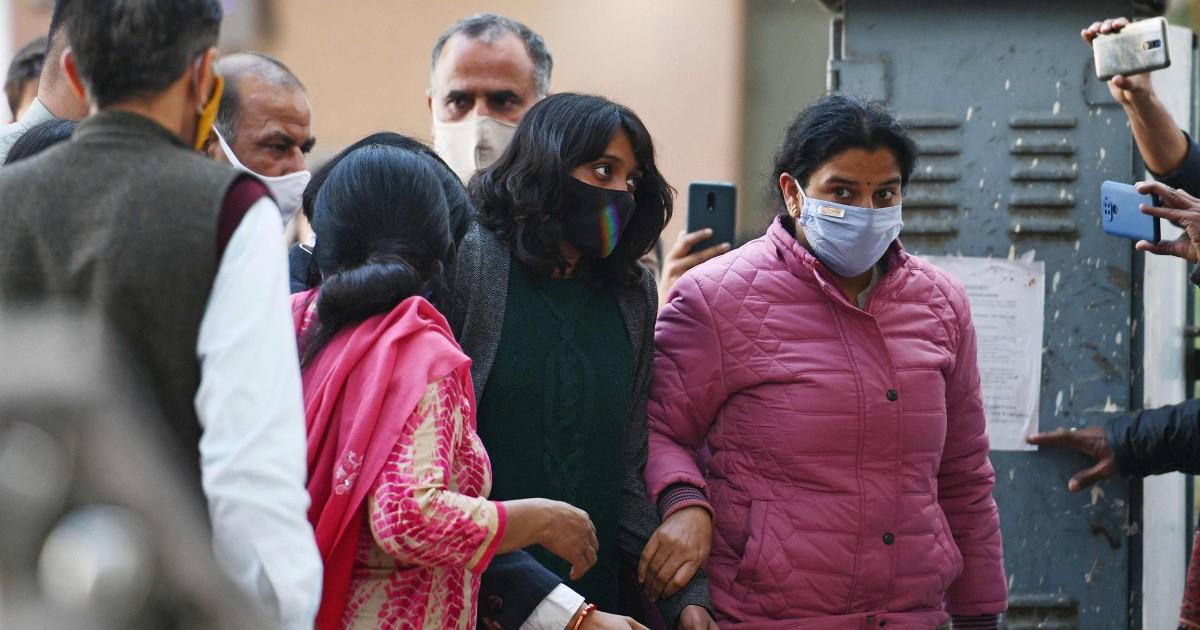
A 22-year-old climate activist has emerged as a symbol of the Indian government’s crackdown on dissent as the country confronts a growing crisis after months of protests from furious farmers.
Disha Ravi was arrested last weekend and charged with sedition, with a Delhi court on Friday granting a police request to extend her detention for three more days. Her lawyers say she was arrested illegally.
Ravi’s arrest prompted protests throughout the country and renewed concerns of an authoritarian backlash to the farmers’ protests that have rocked the country.
She is accused of helping to create and share an online “toolkit” that listed peaceful ways the public could support the protests. The document was later shared online by the Swedish climate activist Greta Thunberg as she joined a litany of global celebrities leading support for the movement.
Since November, tens of thousands of farmers have been camping out in the capital to protest new agricultural laws that they say could destroy their livelihoods and leave them open to exploitation by large corporations.
Ravi fervently backed the cause, tweeting her support for the farmers as they pose a rare and major challenge to Prime Minister Narendra Modi’s authority. Farmers are the most influential voting bloc in India and a key part of its economy.
A well-known figure in the country’s growing environmental movement, Ravi co-founded the Indian chapter of Thunberg’s Fridays for Future (FFF) campaign, an international movement where students skip school on Fridays to protest inaction on climate change.
The movement has gained traction in India, with FFF chapters established in more than 40 states. Ravi was regularly seen at the protests and is known for being increasingly vocal about the issue and her negative view of Modi’s environmental policies.
Critics and opposition figures have disputed the claim that the toolkit helped incite violence at the farmers’ protests, with the sedition charge — which carries a possible life sentence — raising fears about the future of such movements in India.
The South Asia director of Human Rights Watch, Meenakshi Ganguly, described the colonial-era sedition law as “draconian” and called for it to be repealed.
The sedition law is "increasingly being used by a democratically elected government in India to target peaceful critics,” Ganguly told NBC News, criticizing what she termed its "rampant misuse."
And data shows that the filing of sedition cases has increased since Modi came to power in 2014, with cases brought against figures ranging from authors and journalists to opposition politicians.
“Instead of addressing peaceful criticism of policies, or failure to uphold rights, the authorities have displayed bias, targeting critics by accusing them under draconian sedition or counterterror laws and at the same time failing to prosecute government supporters that engage in violence,” said Ganguly.
Members of Modi’s Hindu-nationalist Bhartiya Janata Party (BJP), however, have defended the use of the law and rejected any suggestion of a crackdown on dissent.
"We are a country that believes in nonviolence, but if there are elements that provoke and create conditions that affect the image of this country, this law is still relevant," the national spokesperson of the BJP, Tom Vadakkan, told the BBC.
Ravi’s arrest provoked outrage from high-profile figures, including lawyer and author Meena Harris, the niece of U.S. Vice President Kamala Harris. Some Indian politicians, including members of the main opposition party, expressed their anger as well.
Other see it as an effort to discourage future activism.
Nine-year-old climate activist Licypriya Kangujam told NBC News that the case could “put India in the top most unsafe places for climate and environmental activists in the world.”
“This is an attempt to silence the voices of young girls and women in the country,” she said.
Kangujam, sometimes dubbed "India’s Greta," was detained by police last October during a protest against Delhi’s alarming air pollution levels.
But she vowed not to be intimidated and to continue pressuring the government.
“Being climate activists, it’s our moral obligation to support our farmers," Kangujam said. "They’re already the victims of climate change.”
Article From & Read More ( Disha Ravi: Indian climate activist becomes symbol of crackdown on dissent - NBC News )https://ift.tt/3duSRFp
World
Bagikan Berita Ini














0 Response to "Disha Ravi: Indian climate activist becomes symbol of crackdown on dissent - NBC News"
Post a Comment